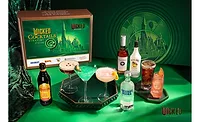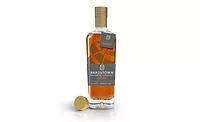An Old Friendship
An Old Friendship
By SARAH THEODORE
Clement Pappas and Apple & Eve foster a
decades-old production partnership
Clement Pappas Co. and
Apple & Eve have been production partners nearly as long as Apple &
Eve has been in business and Clement Pappas has been bottling juices.
Through a co-packing arrangement, Clement Pappas, based in Seabrook, N.J.,
bottles nearly all of Apple & Eve’s multi-serve bottled juice
products, as well as private label juices for most supermarkets in the
country.
The company’s beginnings date back to 1942, when
Clement Pappas, a Greek immigrant to the United States, began canning
seasonal fruits and vegetables. During the mid-1970s, it saw an opportunity
in the juice segment and entered the category that is the business’s
mainstay today. A few years after it began juice production, Apple &
Eve came calling, and a relationship that’s lasted 26 years was
forged.
Apple & Eve does its own product development work,
but Dean Pappas, chief executive officer at Clement Pappas, says his
company is responsible for ensuring the products it bottles are up to Apple
& Eve’s standards.
“We have the kind of relationship where we
really share,” he says. “One thing I will say about Apple &
Eve is that they certainly adhere to proper labeling and high-quality
production standards.”
Today, Clement Pappas has four plants, three of which
were just added during the past seven years. In addition to the facility at
its headquarters in Seabrook, the company has a plant in western North
Carolina, one in Springdale, Ark., and a facility in Ontario, Calif.
“As our customers have become national, they
wanted us to supply them nationally,” Pappas says. “We wanted
to be close to their distribution centers and
service them better so that’s why
we’ve invested in facilities elsewhere.”
The New Jersey facility is located in a part of the
state that once was well known for fruit and vegetable processing. A number
of companies had plants in the area, partly due to its proximity to major
metropolitan markets. Pappas says the company is able to reach nearly 70
million consumers within a 350-mile radius of the plant on an overnight
basis.
“[Retail] chains from the
Baltimore/Washington area, New York, Philadelphia, Pittsburgh, New
England and upstate New York can all backhaul [product],” Pappas
says. “A lot of them have stores in the area, and they’ll
deliver to their stores and backhaul product from us. I’d say that 70
percent of what goes out of here is probably backhauled.”
Clement Pappas doesn’t just bottle juice; it
also is a “first processor” of cranberries. This means it
contracts with growers in Massachusetts, Wisconsin, New Jersey and Canada
to buy fruit and process the cranberries into juice and cranberry sauce.
Processing facilities are located close to cranberry-growing locations
where they are cleaned and frozen and then shipped to Seabrook.
Coincidentally, the company was a cranberry processor
and co-packer for Northland Cranberries prior to its acquisition by Apple
& Eve. It purchased its North Carolina production facility from
Northland, and began bottling many of its juices. It currently bottles all
of Northland’s multi-serve products as well.
Seabrook’s 600,000-square-foot, four-story plant
houses three production lines — two for bottling juice and one for
sauce. It has a capacity of about 100,000 cases per day. With three shifts
daily, running an average of six days a week, the plant employs almost 300
people.
Scheduling production at the plant can be complex, as
Clement Pappas serves hundreds of customers and produces about 2,700 SKUs.
“We’re running to order,” Pappas says. “As our
orders come in, they’re scheduled and we try to turn our inventory
about 24 times a year. We’re giving customers 10 days of lead
time.”
One of the lines at the plant is dedicated to 64-ounce
bottles, and the second line, which is changed over more frequently, runs
48-ounce, 64-ounce, 1-gallon and 96-ounce sizes. The Seabrook plant bottles
only multiserve products, but Clement Pappas bottles single-serve products
in North Carolina and California.
“When we bought North Carolina, they had a more
complete single-serve set up. In California, we built that in —
that’s a plant we built from scratch and developed the flexibility of
having single-serve as well as multi-serve [bottling],” Pappas says.
Products bottled in Seabrook run throughout the week
in a pattern that starts with apple juice, then cranberry blends, citrus
and finally grape products. The facility receives both juice concentrates
and single-strength juices in 55-gallon drums, tanker trucks, or rail cars
for high-use bulk products such as grape juice, citrus and apple.
The juice is stored in several 20,000 to 30,000-gallon
refrigerated storage tanks, but Pappas says it doesn’t stay in
storage long, moving quickly through the plant to preserve color and
flavor.
Products are batched, or blended with other juices and
mixed with value-added ingredients such as calcium and vitamins, at ambient
temperature. The batching process is entirely automated to eliminate the
possibility of mistakes.
The quality control
department is responsible for ensuring that all ingredients meet
specifications, and it examines everything as it comes into the plant and
tests samples after the batching process for Brix, acid levels, color and
other factors before releasing the product to the filler. A final step
before pasteurization includes passing the juice through a series of
filters, including a diatomaceous earth filter.
The blended product is pasteurized in a plate-in-frame
heat exchanger. Juice is heated to approximately 210° F, and then
cooled to about 181° F for filling.
All of the products at the plant are filled in PET
bottles, with the exception of a 1-gallon HDPE jug. During the past year
and half, the plant has converted to rectangular PET bottles, with the
dedicated 64-ounce line leading the transition. The bottles are more
convenient for consumers because they are easy to handle and they can be
stored in the refrigerator door. They also
benefit retailers and distributors because they require 20 percent less
space than a round bottle.
“It took a huge capital expense to do [the
transition] but we did it right,” Pappas says. “In some cases
we enhanced our ability and improved the lines when we did it. We increased
our line speeds and automated [operations].
To accommodate the new bottles, changes were made all the way through the
production process, from conveying and bottling handling to labeling.
The bottling process begins when pallets of empty
bottles enter the receiving area of the plant and are depalletized onto the
filling line. A pressureless combiner uses a combination of gravity, pitch
and belts that move in an offbeat pattern to single-file and orient the
bottles.
The bottles travel to the filler where they are filled
with juice at a rate of 260 to 280 bottles per minute for the 64-ounce
size. Juice is filled at approximately 180° F and then capped. The
temperature is then gradually reduced — over a period of about 25
minutes — in a cooling tunnel until it
reaches 90° to 100° F. It is then labeled and packed in cardboard
cases. The plant uses both six- and eight-pack closed-top cases, and
six-pack open-top cases.
The cases are palletized, stretchwrapped and outfitted
with license plate tags for inventory control
purposes. Finished pallets are stored in one of two warehouses adjacent to
the production building, and can be shipped within 48 hours of bottling.
The past three months have seen major engineering
projects at the Seabrook plant, including the conversion to the rectangular
bottles. “We’re constantly trying to take costs out,”
Pappas says. “When I look back at what our costs were three years ago
or five years ago, it’s astounding how much we’ve improved our
productivity and reduced labor.”
One thing that likely doesn’t need improvement
is Clement Pappas’s partnership with Apple & Eve.
“We’ve had a very good working relationship with Apple
& Eve,” he says. “We’ve helped them grow, and
they’ve helped us grow.” BI
Looking for a reprint of this article?
From high-res PDFs to custom plaques, order your copy today!




